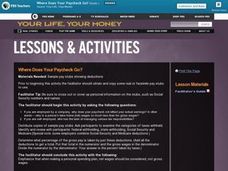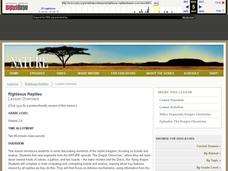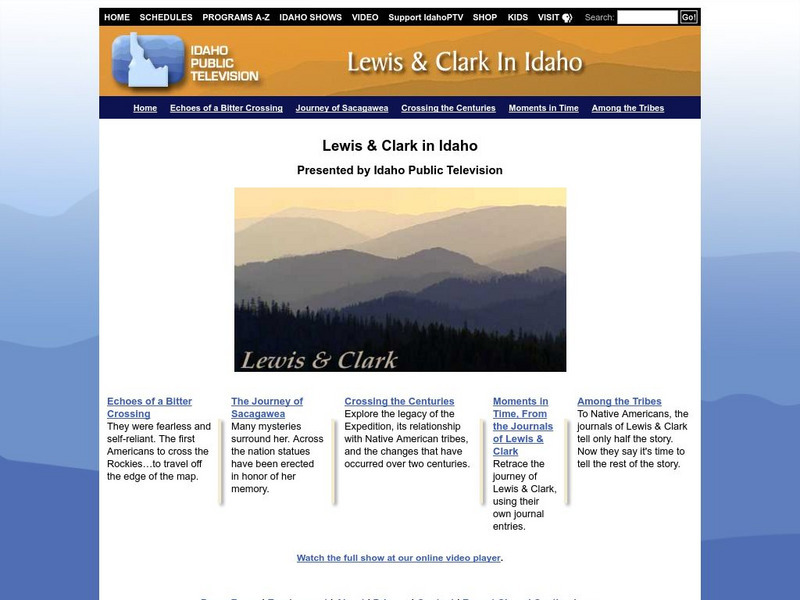PBS
Financial Crisis Glossary
Secondary learners explore the background and vocabulary surrounding US and global economic crises. Originally, the lesson was written to address the 2008 economy, but the material and information is easily adaptable to today's economy....
PBS
Where Does Your Paycheck Go?
Upper elementary learners explore the concept of taxes taken out of an employee's paycheck. As they work through this instructional activity, young mathematicians discover the difference between gross pay and net pay. They also...
PBS
Analyzing the Candidates in the 2008 Presidential Election
High schoolers research the 2008 presidential candidates and the required process for becoming an American presidential candidate. The class discusses both the process and the candidates, and some of the reasons someone might want to run...
PBS
Could You Start a Business?
High schoolers learn how a business starts and finds financial independence. For this lesson, students learn the struggle of financial management, the costs of running a business and how to keep a budget.
PBS
Righteous Reptiles
Young scientists write and draw about their knowledge of reptiles. They also view a nature video focusing on lizards and snakes, complete a chart comparing and contrasting them. Next, they focus on the defense mechanisms...
PBS
Dinosaur Train: Drawing Birds
Kindergarten and first graders watch a video about the characteristics of birds.They then go outside, observe local birds, and discuss the characteristics. Next, they choose one to draw, and are instructed to include all of its...
PBS
This Is Home: The Hmong in Minnesota
This radio series gives an up-close-and-personal view of Hmong history, culture and the challenges of resettling in the U.S. Listen to, or read transcripts of, interviews with Hmong refugees, a clan leader trained by the CIA as part of...
PBS
Idaho Public Television: Lewis & Clark in Idaho
Site offers perspectives on the most difficult part of the Journey - the Bitterroot Mountains. Also gives perspectives from Native Americans - and an engineer tracks the trail! Transcripts of two PBS programs are provided.
PBS
Pbs Learning Media: Brown Reactions: Black Educators
This 1954 statement, issued by a group of black educators, strongly endorses the Supreme Court's Brown ruling.
PBS
Pbs Learning Media: Brown Reactions: Editorials
This sampling of newspaper editorials from the mid-1950s reflects the range of public opinion and responses to the Brown decision.
PBS
Pbs Learning Media: Diamonds: The Science Behind the Sparkle
This illustrated essay from the NOVA Web site explains why the atomic structure of a diamond slows down light and produces a sparkle more brilliant than from any other colorless substance.
PBS
Pbs Learning Media: Tetrapod Limbs
This illustration from Evolution by Monroe W. Strickberger shows the remarkable similarities between the bones in the forelimbs of various tetrapods, all of whose limbs serve very different functions.
PBS
Pbs Learning Media: Shape of Trees: The Frustration Principle
This series of images shows the work of biologist Karl Niklas on the adaptations and evolution of plants. From The Evolutionary Biology of Plants.
PBS
Pbs Learning Media: Whales in the Making
This graphic from Evolution, traces the evolution of whales from land-dwelling mammals to the aquatic creatures we know today. A PDF is included that diagrams the evolutionary process that is believed to have taken place.
PBS
Pbs Learning Media: How Genetic Disorders Are Inherited
Learn how genetic disorders are passed from parents to children as explained in this excerpt from Blazing a Genetic Trail, from the Howard Hughes Medical Institute.
PBS
Pbs Learning Media: What's Your Name? (U)
This video segment from Between the Lions uses a fun hip-hop song about names to highlight the /uh/ sound that the letter "u" makes and to boost phonemic awareness: an understanding of the sounds within words.
PBS
Pbs Learning Media: Seven Selfish Shellfish
This video segment from Between the Lions features a classic tongue twister: a type of wordplay that helps children tune their ears to language and the sounds within words. [0:29]
PBS
Pbs Learning Media: Scientific Processes
In this interactive activity adapted from NOVA, expand your understanding of the scientific process. Watch two videos featuring animations and interviews with scientists, and notice how the processes unfold and vary from one...
PBS
Pbs Learning Media: The Wreck of the Corinthian
This interactive activity, adapted from material provided by the ECHO partners, tells the story of the wreck and towing of the whaling ship Corinthian using three narrative sources.
PBS
Pbs Learning Media: Bowhead Whaling and Its Impact
This interactive activity, adapted from material provided by the ECHO partners, explores the history of whaling in the Arctic seas and Atlantic Ocean, introducing a landmark study of whale populations spanning from 1849 to 1914.
PBS
Pbs Learning Media: Cave Formation: Biogeochemical Cycles
This video segment adapted from NOVA chronicles the discoveries that led to a radical new theory in which living organisms, not just geological processes, play an active role in cave formation. [5:42]
PBS
Pbs Learning Media: Caves and Karst
This interactive resource adapted from the National Park Service presents the key concepts of cave and karst systems, including how and where they form, different types, and various cave environments.
PBS
Pbs Learning Media: Sandy Coasts
In this interactive resource adapted from the National Park Service, learn about beaches, spits, and other sandy landforms that characterize some of America's coastal national parks.
PBS
Pbs Learning Media: Rocky Coasts
This interactive resource adapted from the National Park Service profiles rocky coast environments and describes how various geologic features form.








